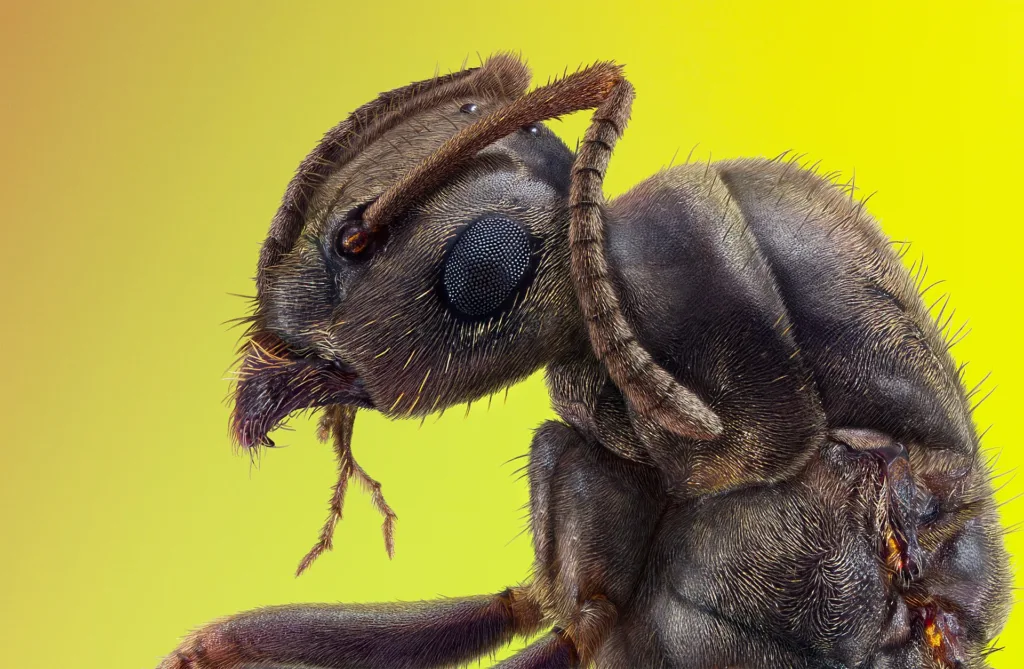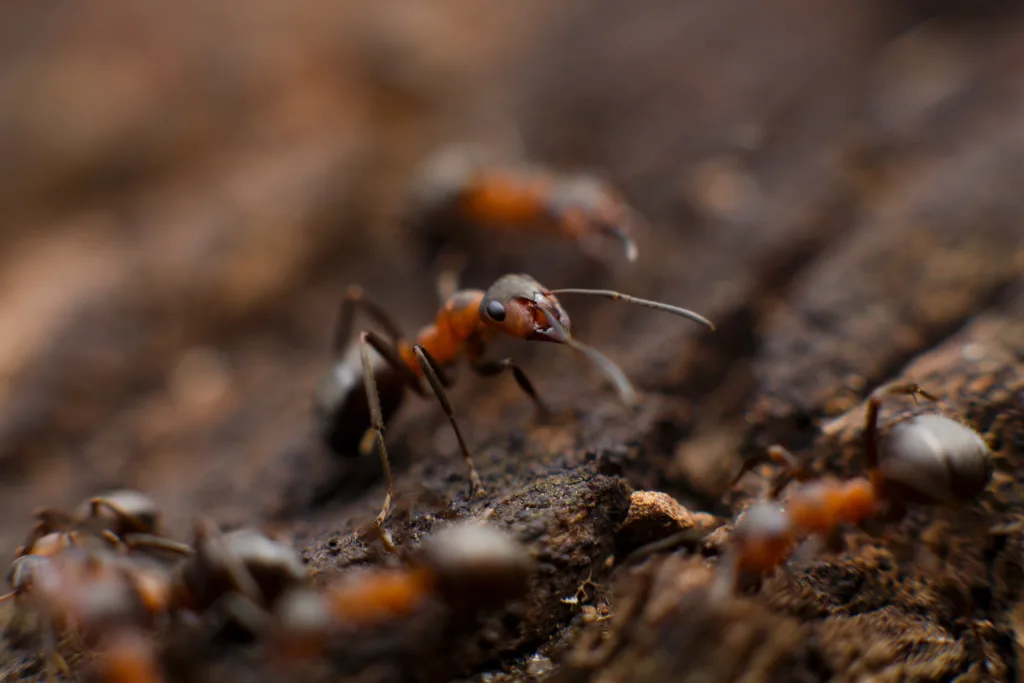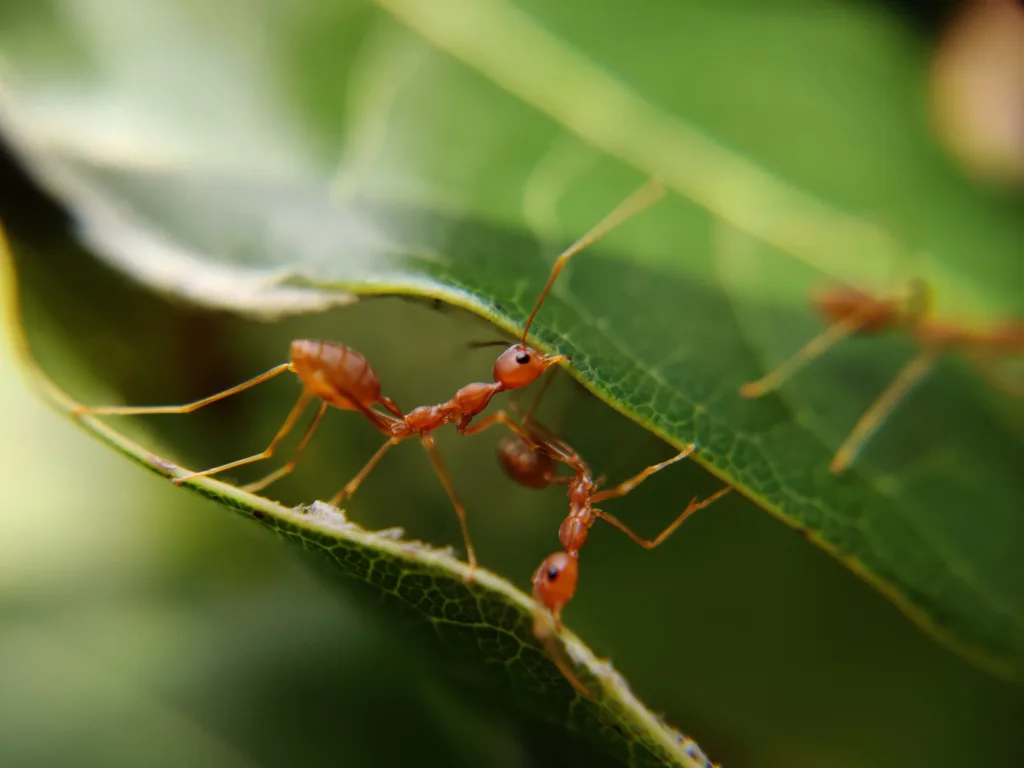Ants are fascinating creatures that have been the subject of study for many years. One question that often arises is whether ants have eyes. The answer is yes, ants do have eyes. However, their eyes are quite different from human eyes.
Ants have compound eyes that are made up of many tiny lenses. These lenses are called ommatidia, and each one sees one point in space. The whole eye sees one image, but different portions of it. This means that ants have a wide field of vision, but their eyes do not offer high resolution or image clarity.
Ants also have three small ocelli, which are simple eyes located on the top of their head. These simple eyes detect light levels and polarization, which helps ants navigate their environment.
While ants can detect movement and see the areas around them, they rely more on their oher senses and information they receive from their legs and antennae. Their sense of smell is particularly important in helping them find food and communicate with other ants.
Despite their poor sight, ants can detect humans. When close to humans, they can see them clearly but not fully because humans are like giants compared to their very small selves.
Ants do have eyes, but their eyes are quite different from human eyes. They have compound eyes made up of many tiny lenses that offer a wide field of vision but not high resolution or image clarity. Ants rely more on their other senses, such as smell, and information they receive from their legs and antennae to navigate their environment.
Do Ants Have Vision?
No, ants are not blind. In fact, ants have compound eyes with many units called ommatidia. These eyes are located on the sides of their heads and allow them to see a wide range of space around them. Each ommatidium sees one point in space, so the whole eye sees one image but diffrent portions of it. While they do not have the same level of visual acuity as humans, they are able to detect light, movement, and color. Additionally, some species of ants have been observed to use polarized light to navigate and communicate with each other. So, it is safe to say that ants are not blind and have a unique visual system adapted to their needs.

Do Ants Have Eyes?
Yes, ants have eyes. Their eyes are called compound eyes, which are made up of numerous tiny lenses attached together. Additionally, ants have three small ocelli, also known as simple eyes, located on the top of their head. These ocelli detect light levels and polarization, while their compound eyes are good for acute movement detection but do not offer a high resolution image.
Do Ants Have the Ability to See?
Yes, ants can see, but their eyesight is not as advanced as that of humans or many other animals. Most species of ants have compound eyes, which means their eyes have multiple lenses that alow them to detect movement and see the areas around them. However, their eyes are not particularly good at seeing objects at a distance, and they rely more on their other senses, such as touch and smell, to navigate and find food. In addition, some species of ants are completely blind and rely solely on their other senses to survive. Overall, while ants do have the ability to see, their eyesight is not their primary means of perception and navigation.
Can Humans Be Seen by Ants?
Ants have the ability to see or sense humans, but their vision is relatively poor due to their small size. When in close proximity to humans, ants can see them clearly, but due to the vast difference in size, humans may appear as giants to the ants. Despite this, ants are capable of detecting humans by using their sense of smell and other senses, such as touch and vibrations. In summary, ants have some level of visual awareness of humans, but their other senses play a more significant role in detecting them.
Can Ants Make Sounds?
No, ants cannot scream. Insects, including ants, do not have vocal cords or a larynx, which are necessary for producing sounds. While ants do communicate with each other through various methods such as pheromones and vibrations, they do not have the ability to vocalize or scream. Any sounds that ants produce are typically the result of their movements or interactions with their environment, rather than intentional vocalizations.

Do Ants Experience Pain When Falling?
Recent research has shown that insects, including ants, experience something akin to pain. This suggests that falling may cause discomfort or distress to ants, although it may not be the same as the experience of pain that mammals feel. It is important to note that ants have a very different nervous system than mammals, so their experience of pain may be different as well. Ultimately, furthr research is needed to fully understand the experience of ants and other insects when they fall.
Do Ants Urinate?
No, ants do not have pee as we know it. Unlike humans and other mammals, ants and most insects do not have a separate urinary tract or bladder. Instead, all their waste products are eliminated through a single opening called the anus. This means that both solid and liquid waste are expelled together as a single substance.
While ants do produce waste liquids, they are not urine in the traditional sense. These liquids are produced by special glands in the ant’s body and are used for a variety of purposes, such as marking trails or defending against predators. These liquids are not stored in a bladder or eliminated separately from solid waste.
So, to sum up, ants do not have pee in the way that humans do. Instead, they eliminate all their waste products, including any liquid components, through a single opening.
Do Ants Have a Heart?
Yes, ants have a heart. However, their circulatory system is quite different from that of a human or other vertebrates. Ants have an open circulatory system, which means that the hemolymph (the insect equivalent of blood) is not enclosed in blood vessels but instead flows freely throughout the body. The heart, called the dorsal aorta, is a long tube that runs down the length of the ant’s body and pumps hemolymph rhythmically. The hemolymph transports nutrients, hormones, and waste products throughout the body and also plays a role in the ant’s immune system. Despite the differences in their circulatory system, the heartbeat of an ant is stil essential for their survival and proper bodily functions.
Are Ants Capable of Hearing?
Ants are not completely deaf, but their ability to hear is very different from the hearing of animals that have ears. Instead of having ears, ants use a combination of sensory organs to detect sound vibrations in the air and on the ground. These sensory organs, called sensilla, are located on their antennae and legs. The sensilla respond to different frequencies and intensities of sound, allowing ants to detect and interpret a wide range of acoustic signals.
While ants are able to detect sound, they are not able to process it in the same way that humans or other animals with ears do. Instead of hearing sounds as we do, ants use sound vibrations to communicate with each other and to locate food sources. Ants also use sound to detect the presence of predators and to navigate through their environment.
Overall, whie ants do possess the ability to detect sound, their hearing is quite different from that of other animals with ears. Instead of processing sound waves as we do, ants use sound vibrations to communicate and navigate through their environment.

Do Ants Experience Anger?
No, ants don’t feel anger or any other complex emotions as they lack the brain structures and neural networks required to experience such feelings. While ants do exhibit aggressive behavior towards other ants or intruders that threaten their colony, this is purely driven by their innate instincts and pheromonal cues. Ants communicate with each other through chemical signals or pheromones, which allow them to coordinate their activities and respond to threats. Therefore, while ants may display aggressive behavior towards outsiders, this is not driven by emotions like anger, but rather a reflexive response to protect their colony.
Do Ants Experience Loneliness?
Recent studies have shown that ants are highly social insects that rely on their colony members for survival. They work together to gather food, defend their nest, and care for their young. If an ant is isolated from its colony, it may struggle to survive as it lacks the support and resources that it needs to survive. In fact, research has shown that ants can die after just a few days of isolation. While we cannot say for certain whether ants feel lonely, it is clear that social interaction is critical to their well-being and survival.
The Role of Ants’ Brains and Hearts
Ants have both brains and hearts. The ant’s heart is responsible for pumping the haemolymph (blood) from one end of the body to the other. The heart of an ant is long and thin and loos and functions differently from our own. On the other hand, the ant’s brain is responsible for controlling various functions of the ant’s body, including movement, communication, and decision-making. The ant’s brain is relatively small, but it is highly specialized and capable of complex behaviors. Overall, both the ant’s heart and brain are critical for its survival and important for understanding the biology of these fascinating insects.
How to Scare Away Ants
Ants are repelled by various strong scents, natural substances, and spices. One of the most effective natural repellents is cayenne pepper. Ants hate cayenne pepper, and it can be used to create a barrier that will keep them away from your household. Other substances that repel ants include vinegar, cinnamon, citrus peels, and coffee grounds. These items can be placed in areas where ants are frequently spotted or used to create a barrier around your home. Additionally, essential oils such as peppermint, eucalyptus, and tea tree oil have a strong scent that can repel ants. By using tese natural remedies, you can effectively keep ants away from your home without resorting to harmful chemicals.
The Intelligence of Ants
Ants are known for their remarkable collective intelligence, but individual ants themelves have very small brains. They do not possess the cognitive ability to perform complex problem-solving or reasoning tasks like humans or other highly intelligent animals. However, what makes them intelligent is their ability to work together in a highly organized and efficient manner to achieve common goals. Ants display impressive navigation skills, communication abilities, and the capacity to adapt to changing circumstances. They can also care for their young, farm fungus, and avoid danger from predators. Therefore, while individual ants may not be highly intelligent, as a collective, they exhibit a remarkable level of intelligence and sophisticated behavior.
Conclusion
In conclusion, ants do have eyes, although their eyesight is not particulrly great. Ants have compound eyes made up of numerous tiny lenses attached together, allowing them to detect movement and see the areas around them. However, their eyes do not offer a high resolution image, and they rely more on other senses such as their legs and antennae to gather information about their surroundings. Ants can detect or sense humans, but their poor eyesight may limit their ability to fully see or understand them. Overall, while ants do have eyes, they are not their primary means of gathering information about their environment.
